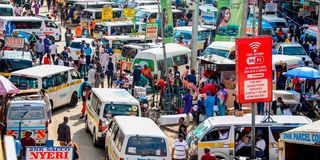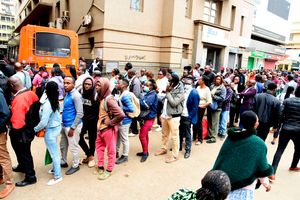
Travellers at Tea Room matatu terminus in Nairobi in this picture taken on December 18, 2023.
It was reported last week that a young man lost his life because a matatu tout allegedly pushed him out of the moving bus during an argument over Sh30 fare.
In another incident that happened years ago in which a passenger died in similar circumstances, the driver and tout involved were jailed for life. The sentence was apparently made harsh by the judge for it to be a lesson to other matatu drivers and touts behaving in a similar fashion.
Fair enough, but I believe judgments based on emotions or to pander to the media and the public are unjust. Judgments must be made based on legal facts. Cases involving matatu touts easily become “open and shut” due to the fact that many Kenyans perceive those who work in the industry, especially the touts, negatively.
They are considered roguish, uncouth and violent. That may be so, but dealing with the public is no mean feat. The pressure from the owners of the matatus for the crew to hit a certain daily target comes with even more added pressure. All these are things that can easily boil over. Drug misuse in the industry is allegedly rife, too. Having said that, matatu crew still deserve a fair hearing.
The only best thing for me about the matatu culture is the art work and perhaps the fact that they are helpful to Kenyans who may not be able to get from point A to B due to not being able to afford private cars. Everything else is scary, chaotic and uncertain.
They leave when they feel like it and drop you whenever they feel like it at any time of day or night. They left me at a dumpsite one night in a slum I was unfamiliar with because their shift had ended. Which makes safety, especially for women, in matatus risky. They are also not safe for the elderly, the disabled, pregnant women and children.
Pornography
The matatus target group has always been the youth who are thrilled by the speed, music, artwork and pornography. How the latter was even allowed in a transport system used by all ages, including children, I don’t know. It is irresponsible of the government.
There have been a lot of talk about changing the culture by creating a public transport system that would eradicate all the problems associated with matatus. No government has been bold enough to shut the industry down, because matatu owners have become law unto themselves and operate like the mafia.
It is not surprising that matatus misbehave if allegations that most of them are owned by senior government officials, including traffic police officers, are indeed true. Whoever the owners are, matatus exhibit a culture of selfishness that exists in our society, where public services are majorly for the benefit of individuals rather than for the greater good of everyone. Destruction of the healthcare system by a few individuals for monetary gain and unfinished important public buildings due to corruption are just among the few ways in which we operate selfishly, with little regard for service users.
A public transport system could address all the problems associated with matatus if selfish interests could be put aside. Selflessness has been a difficult thing for Kenyan officials to achieve it seems.
More conflict
Cancelling the licences of a few matatus for misdemeanours does not address the deep-seated problems associated with the industry. It just causes more conflict between the government and the matatu owners, and harms the passengers.
An effective and well-managed public transport system would benefit all, including the crew who could be trained and employed to run them. If they are made to run on reliable schedules, they would save passengers time, which they could use to contribute to the economy and improve their social lives too. It would also be easy for visitors to the city to use them. Set fares could also help passengers save money by being able to budget, unlike now when they are at the mercy of the matatu crews.
A public transport system could also go a long way in reducing the number of cars on the road if it is reliable and safe enough for everyone. UN-Habitat reported in 2019 that “in Nairobi, traffic congestion costs the capital city an estimated $600,000 each day due to time wasted on the road”. That amount must have tripled by now I would imagine as more and more cars come onto the roads.
The chaos in our transport system is affecting every facet of our lives as we cannot plan our days effectively. To restore order, we must introduce a public transport system that would address the problems associated with matatus. A slap on the wrist approach or locking up one or two crew members are a short term measure. What we need are long-term plans on how to get Nairobi moving safely, faster.
Ms Guyo is a legal researcher. [email protected]; @kdiguyo







